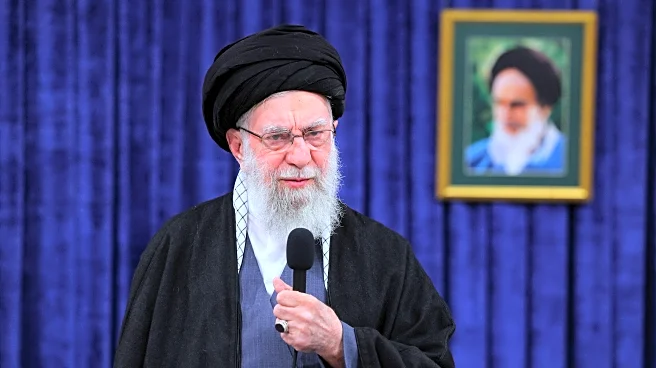What's Happening?
The Houthis in Yemen have been using humanitarian aid as a strategic tool in their ongoing conflict with the internationally recognized government based in Aden. Since the civil war began in 2014, the Houthis have implemented policies to weaken the government, particularly targeting Yemen's energy sector, which previously contributed significantly to the country's GDP and government income. In 2022, the Houthis halted oil and gas exports by threatening drone attacks, resulting in a loss of $2-3 billion in annual revenue. They have also diverted shipping traffic from Aden to Hodeidah, further reducing government income. Humanitarian aid is restricted to entering northern Yemen through Houthi-controlled gateways, bypassing the southern government-controlled port of Aden. This strategy deprives the government of revenue and strengthens the Houthis' position, despite deteriorating conditions in their controlled areas.
Why It's Important?
The manipulation of humanitarian aid by the Houthis has significant implications for Yemen's stability and the effectiveness of international aid efforts. By controlling aid routes, the Houthis generate revenue and weaken the southern government, exacerbating the humanitarian crisis. This strategy has left the government in Aden increasingly dependent on aid from Saudi Arabia and the UAE, while protests and unrest grow due to the government's inability to provide basic services. The Houthis' actions challenge international organizations, which must navigate complex political dynamics to deliver aid effectively. The situation underscores the need for a coordinated international response to address the humanitarian needs of Yemen's civilians and counter the Houthis' economic warfare.
What's Next?
Recent attacks by the Houthis on commercial ships in the Red Sea have made Hodeidah less safe for international organizations, potentially prompting a reevaluation of aid delivery strategies. Shifts in U.S. policy under the Trump administration may open opportunities for strengthening the government in Aden and limiting Houthi exploitation of humanitarian channels. The international community faces a critical decision: whether to confront the Houthis' manipulation of aid or continue policies that inadvertently empower the group at the expense of Yemen's civilians.
Beyond the Headlines
The Houthis' use of aid as leverage highlights broader ethical and legal challenges in conflict zones, where humanitarian efforts can be co-opted for political gain. The situation in Yemen raises questions about the role of international organizations in conflict resolution and the need for transparency and accountability in aid distribution. Long-term, the Houthis' strategy could further entrench divisions between northern and southern Yemen, complicating efforts to achieve lasting peace and stability.











